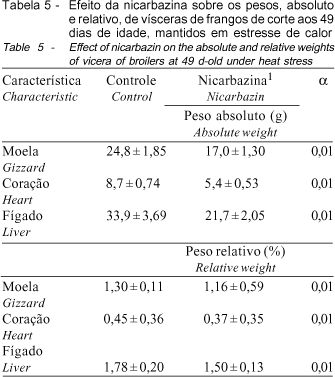This work was conducted aiming to evaluate the effect of the addition nicarbazin and lysine levels in the diet of broilers from 1 to 21 days of age and its residual effect on the period from 22 to 49 days of age. The broilers were created in high environmental temperature. Four hundred and eighty male broilers Ross brand were used, in a completely randomized experimental design, in a 2x4 factorial arrangement (addition or not of nicarbazin and level of lysine), six replications of 10 birds per experimental unit. Nicarbazin and monensin were added to 1-21d and 22-42d diets, respectively, in a dual anticoccidial program and a control anticoccidial program where only the monensin was fed to the birds from 1 to 42 d. The diet and the water were ad libitum fed. Birds fed nicarbazin-monenzin showed lower feed intake and average weight gain, and higher feed:gain ratio than those fed control anticoccidial program. The body weights and the carcass and edible cuts yield were reduced by the effect of the nicarbazin. The birds fed diet with nicarbazin showed reduced absolute and relative organs weights as compared to those that did not receive the drug in the diet. The addition of nicarbazin in diets for broilers under heat stress is not feasible.
broiler; heat stress; lysine; nicarbazin






